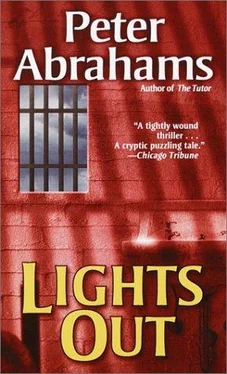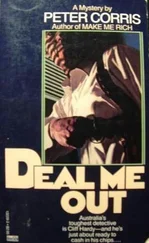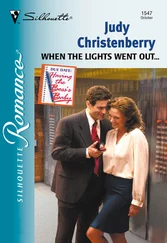Peter Abrahams - Lights Out
Здесь есть возможность читать онлайн «Peter Abrahams - Lights Out» весь текст электронной книги совершенно бесплатно (целиком полную версию без сокращений). В некоторых случаях можно слушать аудио, скачать через торрент в формате fb2 и присутствует краткое содержание. Год выпуска: 2002, ISBN: 2002, Издательство: Fawcett Books, Жанр: Триллер, на английском языке. Описание произведения, (предисловие) а так же отзывы посетителей доступны на портале библиотеки ЛибКат.
- Название:Lights Out
- Автор:
- Издательство:Fawcett Books
- Жанр:
- Год:2002
- ISBN:978-0345445780
- Рейтинг книги:4 / 5. Голосов: 1
-
Избранное:Добавить в избранное
- Отзывы:
-
Ваша оценка:
- 80
- 1
- 2
- 3
- 4
- 5
Lights Out: краткое содержание, описание и аннотация
Предлагаем к чтению аннотацию, описание, краткое содержание или предисловие (зависит от того, что написал сам автор книги «Lights Out»). Если вы не нашли необходимую информацию о книге — напишите в комментариях, мы постараемся отыскать её.
Lights Out — читать онлайн бесплатно полную книгу (весь текст) целиком
Ниже представлен текст книги, разбитый по страницам. Система сохранения места последней прочитанной страницы, позволяет с удобством читать онлайн бесплатно книгу «Lights Out», без необходимости каждый раз заново искать на чём Вы остановились. Поставьте закладку, и сможете в любой момент перейти на страницу, на которой закончили чтение.
Интервал:
Закладка:
Julio ducked out of sight. The door slammed shut. The truck jerked back out into the street.
Rain lashed down on Eddie and the chickens. The chickens went quiet. Eddie felt around for a tarpaulin. Wasn’t there always a tarpaulin in the back of a truck? Not in this one. He sat huddled between the cab and the cages. Rain swept down, cold and hard. Eddie bounced around on wet steel. None of that bothered him. The espresso was still warm inside him, and if he tilted his head back he had a wonderful view of skyscrapers rising into the night. It reminded him of a line from his reading: “Alps on Alps arise.” That was the city of Karen de Vere, champagne and Armagnac. He lost his enthusiasm for the view.
The rain stopped abruptly; the skyscrapers vanished. They were in a tunnel. The chickens shifted nervously. Newspaper rustled on the floors of their cages. Eddie made a clicking sound. It failed to soothe the chickens. He was struck with the mad idea of opening the cages and letting them all out.
Then he was back in the rain. The truck swung onto a ramp, halted soon after at a toll booth, then sped off on a turnpike under sodium-orange skies. The rain stung. Eddie got his back against the cab, hunching below the window; the chickens tucked their heads under their wings and endured. They all did it, even though the only ones getting wet were in the top row.
The truck seemed to be heading south. Eddie confronted the possibility that while there had to be a connection between Dr. Messer, Senor Paz, El Rojo, and the hundred-dollar bill, the ponytailed man might have nothing to do with it. Why would he, especially since Messer hadn’t even entered 719? Maybe it was only the outside of 719 that mattered. Julio could be on his way home to the wife and kids, or to a bowling alley, or, more probably, to a second job at a meat packer’s. A beer can flew out of the cab, and then another.
Eddie was soaked and shivering by the time the truck left the turnpike. They followed a two-lane road, going more slowly now. The sky lost its orange glow, went black. The only light came from headlight beams that flashed from time to time across the cages. Eddie caught glimpses of the chickens; they appeared headless, as they soon might be. More beer cans flew by, faint whizzing shadows in the night.
Time passed, how much time Eddie didn’t know. His watch was on Prof’s wrist, locked up in F-Block. Eddie was wet, cold, unsure; but free, and therefore happy, right?
The truck slowed, down to a speed where Eddie could have jumped off safely. He considered it, and was still considering it when they turned onto a dirt road and bumped through a wooded flatland. The trees stretched overhead, catching some of the rain. Under their shelter, the chickens came to life, shifting around in their cages, nervous again. Just like inmates: catatonic when things were at their worst; agitation always following slight improvements.
They were alone on the dirt road. Five or six miles passed before the truck came to a stop. Eddie rose, peered over the side. The headlights shone on a fence, not especially high but made of barbed wire, stretching out of sight in both directions; a closed gate on which hung a sign-“Simon Poultry Farms”; a gatehouse with a motorcycle parked inside; and a man standing in the road with an automatic weapon over his shoulder and a shotgun in his hands. He approached the truck.
The man spoke in Spanish. “Late,” he said.
“You drive in this piss,” the driver told him.
“Try standing in it all fucking night,” answered the man with the guns. He opened the gate, backed into the shadows. The truck rolled through.
The truck mounted a long, low rise, turned right off the main road, came down in a clearing. In the changing angles of the headlights, Eddie picked out an old two-story farmhouse, a barn, outbuildings. The truck passed the barn, turned toward the house, slowed. The door of the house opened, framing a short, round man in a yellow rectangle of light. Eddie hopped off the truck, slipped on wet grass, came up running. A fruit tree, gnarled and bare, grew between the house and the barn. Eddie crouched behind it.
The short, round man unfurled an umbrella and walked to the truck. Julio and the driver got out. The driver was a big man, perhaps six and a half feet tall. The short, round man went as close to him as the umbrella would allow.
“You’re late,” he said. He spoke Spanish, but Eddie recognized his voice: Senor Paz.
“It’s the weather.”
“And you’ve been drinking.”
“Just one beer on the way.”
Paz reached up from under the umbrella and slapped the driver’s face with the back of his hand, the way he’d slapped Eddie.
“Sorry,” said the driver.
Paz wasn’t listening. He had moved in front of Julio. “You too,” he said. “I can smell it.”
“Not me.”
Paz spoke to the driver. “Hit him.”
The driver threw a punch at the ponytailed man’s head, knocking him down.
Paz said, “Now get busy,” walked back into the house, leaving the door open.
The driver helped Julio to his feet. “Did it have to be that hard?” asked Julio.
“Just doing my job,” the driver replied.
The driver went around to the back of the truck, climbed up, began hoisting off the rear slatted sections and stacking them to the side. Julio went into the house, returned with an empty cardboard box. The driver opened one of the cages, tossed the chicken and the newspaper flooring onto the ground, picked up the cage and dumped it out into the cardboard box. The chicken skittered across the grass and into the barn.
The driver opened another cage and went through the same routine, tossing out the chicken and the newspaper, dumping what was left into the cardboard box. He kept doing that until Julio said, “Enough,” and carried the box into the house. He came back with an empty one, and they did it all again.
And twice more. The last time the driver followed Julio into the house and closed the door. Eddie came out of the shadows.
He made a wide circle around the house, approached it from the back. Lights shone through the windows on both floors. Eddie dropped to the wet ground and crawled to the nearest one, raised his head above the sill.
He looked into a big kitchen, saw a cozy rural scene. Julio and the driver sat in front of a stone fireplace, roasting marsh-mallows over a snapping four- or five-log fire. A glossy German shepherd lay beside them, staring into the flames. At one end of the long table in the center of the room sat Paz, reading a newspaper and eating vanilla ice cream; pure white against his olive skin, his red tongue. Three old women in kerchiefs and shawls sat along the far side of the table, facing Eddie, chatting to themselves.
While they talked, the old women busied themselves with the cardboard boxes Julio had brought in. The first two emptied them, spilling paper money across the table. Then they sorted it into piles by denomination, banded the bills in stacks, dropped the stacks into a canvas bag. The third woman made entries on a laptop and called to Julio when the bag was full. He got up from the fire and added the bags to a mound of others near the door. The women filled three canvas bags while Eddie watched; their knobby hands never stopped, working together like giant inhabitants of an insect colony.
Suddenly, the dog’s ears rose. Eddie sank down, listened, heard nothing. He crept along to the next window, looked in.
A bedroom. The only light came from a TV on a corner desk. On the screen a hideous man with four-inch nails was tiptoeing toward a car parked in a lovers’ lane. The only viewer was a dark-haired boy of about ten or eleven lying on the bed, but he wasn’t paying much attention to the show. He was more interested in the gun in his hand.
Читать дальшеИнтервал:
Закладка:
Похожие книги на «Lights Out»
Представляем Вашему вниманию похожие книги на «Lights Out» списком для выбора. Мы отобрали схожую по названию и смыслу литературу в надежде предоставить читателям больше вариантов отыскать новые, интересные, ещё непрочитанные произведения.
Обсуждение, отзывы о книге «Lights Out» и просто собственные мнения читателей. Оставьте ваши комментарии, напишите, что Вы думаете о произведении, его смысле или главных героях. Укажите что конкретно понравилось, а что нет, и почему Вы так считаете.












